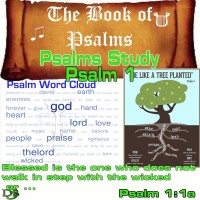

Read: Psalm 1:1-2 |
Blessed!
In the beginning of the first book of Psalms, in the very first sentence, with the initial word, David lauds blessedness. He explains that believers who avoid the counsel of the wicked and delight themselves in the law of the Lord receive multiple blessings.
Psalm 1 employs a form of parallelism which often appears in Hebrew poetry. It tells us what a righteous believer should and should not do and what they have to look forward to. This is contrasted with what befalls the ungodly in the end.
How to be Blessed!
I believe all Believers want to be blessed and highly favored by God.
In the original Hebrew, the word “blessed” is plural and means “blessednesses”. [Martin Luther] In other words, multiple or many blessings. For a believer, a state of “blessednesses” is as close as we can get to heaven on earth.
So how do we achieve this state? The first three ways mentioned are things that we “should not” do. Sir Richard Baker notes the usage of the negative command of “does not” as significant. If stated in the affirmative it would not as clearly say “never”. However, by using the negative, “does not”, it clearly conveys not at all or at any time. David notes that we are to:
- Not walk in step/counsel with the wicked
- Step/Counsel – Seek godly counsel only; Do not listen or heed to the advice, habits and influence of the wicked
- Not stand in the way/path that sinners take
- Stand – Stand with God; Sinners will lead us toward their unmovable, unwavering stance with anecdotal evidence against godly ways and thinking
- Not sit in the company of sinners
- Sit – Rest only in the Lord and among His flock; do not settle amongst the company of sinners
- Meditate and delight in the law of the Lord
- Meditate – Hide the Word in our hearts through prayer, study and meditation
- Delight – Find enjoyment in doing things God’s way; follow His plan for our lives
As believers, if we follow these first three verses, then we are truly blessed. We will be like an evergreen tree that receives heavenly nourishment and yields spiritual fruit that meets the needs of our family and anyone under our tree cover.
The Woe awaiting the wicked
Verse four begins the contrast of the wicked with “not so”. The righteous prosper and are blessed, but not so for the wicked.
The wicked are compared to chaff. Chaff is the scaly, inedible husk that surrounds grain. In ancient and some primitive cultures even today, grain is separated from chaff by manually beating it on the threshing floor. After repetitive beating, a winnowing fork is used to toss everything into the air. The wind sweeps away the chaff and the grain falls down into the pile. In this case, it is clear that the wicked when they face judgement, will be like the chaff. They won’t be allowed into paradise, they will be whisked away, at their own choosing, to eternal damnation.
At the genesis of this great chapter, we are taken back to the choice that Adam and Eve had in the Garden of Eden. The sum of the ways of the righteous and the woes of the wicked leave a clear and distinct choice for believers. When we count the costs, the promised outcome of a righteous life leads us heaven-ward. Yet, some still miscalculate and accept the woeful alternative of hell.
God won’t make the choice for them or for us.
We each must choose for ourselves. As for me and my house, we will serve the Lord! [Joshua 24:15]
Questions:
1. Discover –
A. Do you feel blessed by God? What evidences do you cite if you are or are not blessed?
B. Do you consult FaceBook/Twitter/Instagram/Snapchat/GroupMe/WhatsApp more often in a week than you do the Bible? If so, does that mean that you are “walking in the counsel” of Social Media? Discuss with your prayer partner.
2. Develop –
A. In both the Old and New Testaments, the threshing floor was a symbol of judgement. If your old ways are the chaff and your new ways are the grain, is there any chaff in your life that hasn’t quite been removed on the threshing floor? What would it take for you to release yourself from its grip and accept more blessedness?
3. Demonstrate –
A. Does your life demonstrate a life of “blesednesses”? What are the tangible things that you can point to?
B. Knowing the destination of the wicked, how do you pray for and work with friends and family that are on the path of the wicked. How do you witness to them?
Psalms
Overview – Part 1 – Why, What and Who
Overview – Part 2 – Poetry, Prayer and Power
Part 3 – 5 Books in One
Book 1
Psalm 1
Psalm 2
Psalm 3 and 4
